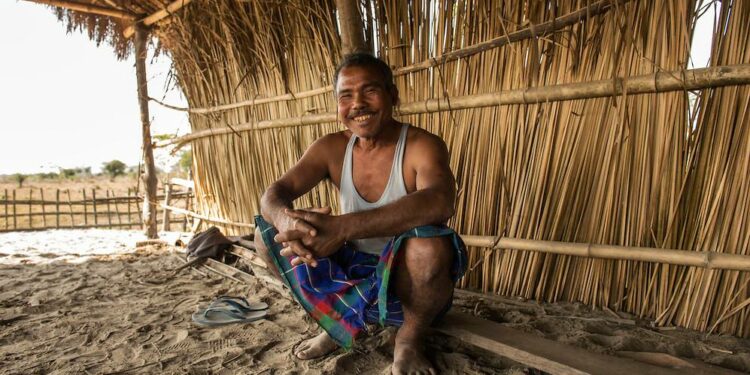Across the globe, forests encounter escalating challenges from deforestation, driven by humanity’s ceaseless quest for resources and agricultural expanses to sustain the ever-expanding population.
As per Global Forest Watch, in 2010, India boasted 31.3 million hectares of natural forest, covering 11% of its total land area. However, by 2021, it experienced a loss of 127 thousand hectares of natural forest, resulting in the release of 64.6 metric tonnes of CO2 emissions.
The loss of forests is not just limited to the tree cover, but an entire ecosystem that is dependent on it.
Sixty-five year old Jadav Payeng who is popularly known as the ‘forest man’ of India has accomplished an incredible task of creating a forest out of nothing. As a teenager, Jadav Payeng, a native of Majuli in Assam, personally witnessed the transformation unfolding before his eyes. Majuli, situated near the Brahmaputra River, served as the residence of the indigenous Mishing tribe and holds the distinction of being the world’s largest inhabited river island.
In 1979, he encountered numerous lifeless snakes strewn across the sandy shores of the island, succumbing to the extreme heat. These reptiles, displaced by floods, sought sanctuary on the island but couldn’t endure the conditions of the sandbar.

Witnessing this distressing scene led him to contemplate the possibility of a similar fate for humans. In search of solutions, he sought advice from elderly tribals who suggested planting bamboo. Taking this advice to heart, he began planting bamboo along the coastline.
The floods had denuded the island and the young lad, when he was barely 16-years-old in April 1979, decided to create a new life on the tough terrain covered with sand and silt. Jadav turned to the villagers, who advised him to grow trees and offered 50 seeds and 25 bamboo plants. He sowed the seeds and shoots and now, 36-years later, he has reaped a forest.
The 1,360 acres that make up the Molai forest, which bears his name, are situated in Jorhat, close to Kokilamukh. However, making it wasn’t simple. In addition to personally gathering and carrying red ants from his village to the sandbar, Jadav watered the plants morning and evening. Eventually, nature gave back, and the forest was home to a wide range of plants and animals, including rare species like the Royal Bengal Tiger and the One-horned Rhino.
 During this period, the social forestry wing of the Assam State Forest Department initiated a trial afforestation initiative on the island, aiming to mitigate floods and prevent soil erosion.
During this period, the social forestry wing of the Assam State Forest Department initiated a trial afforestation initiative on the island, aiming to mitigate floods and prevent soil erosion.
Payeng was among the numerous locals who participated in the tree-planting initiative, but unlike others who eventually departed, he chose to remain. Continuing to nurture the saplings, he transformed the area. Initially a segment of the mainland altered into a river island due to soil erosion, into a flourishing forest.
Almost four decades later, the Mola’r Haabi (Mola’s forest), named in honor of Payeng, spans an impressive 1,390 acres.
He cultivated various tree species such as valcol, arjun, ejar, goldmohur, koroi, moj, himolu, and bamboo, resulting in the development of a dense and self-sustaining forest. This habitat now hosts a diverse array of wildlife, including tigers, rhinos, over 100 deer, rabbits, monkeys, and numerous bird species, including a significant population of vultures. The forest even attracts frequent visits from a large herd of elephants.
Despite dedicating years to nurturing the forest, Payeng’s remarkable efforts remained largely unnoticed by the outside world.
Forest authorities reportedly discovered the forest in 2008 while tracking a herd of elephants that had migrated there after causing damage to crops in a neighboring village.
Jitu Kalita, a wildlife reporter and columnist from Jorhat, brought Payeng’s story to public attention in 2009, leading to its viral spread.
During an event at JNU in April 2012, the then-vice-chancellor Sudhir Kumar Sopory bestowed upon Payeng the title “Forest Man of India,” a designation he has carried ever since.
Globally, his efforts have been widely recognized and celebrated. Residing in proximity to the forest he nurtured, Payeng persists in planting saplings in the area.
Internationally acclaimed, Payeng has garnered numerous awards and honors for his remarkable efforts, including the prestigious Padma Shri, the fourth-highest civilian award in India, bestowed upon him in 2015. Despite being a school dropout, he received honorary doctorate degrees from both Assam Agricultural University and Kaziranga University in recognition of his significant contributions.
His impactful work has been showcased in various award-winning documentaries, notably in the documentary titled ‘The Molai Forest’ released in 2012.
Having witnessed the impacts of climate change firsthand, Payeng is dedicated to enlightening the younger generation about the ongoing crisis.
Expanding his tree-planting mission globally, in 2021, Mexico extended a 10-year visa to Payeng, seeking his assistance in revitalizing the country’s green cover.
We, Indians, are proud of or ‘Forest Man’.


















Discussion about this post